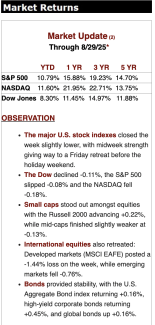
Financial Commentary September 2, 2025
ECONOMIC REVIEW
- New-home sales in July rose to an annualized pace of 652,000 homes sold, beating forecasts, and were led by strength in the Western part of the country.
- Consumer confidence slipped 1.3 points to 97.4 in August, modestly above the 96.5 forecast, but sentiment weakened as market concerns grew and expectations for the months ahead declined.
- U.S durable goods orders fell 2.8% in July to $302.8 billion, extending June’s 9.4% drop, but less than the 3.8% expected decline.
- Pending home sales slipped 0.4% in July, a sharper drop than the 0.2% decline expected, marking a second straight monthly contraction, as high prices and borrowing costs continue to weigh on affordability.
- U.S. Gross Domestic Product (GDP) expanded at an annualized rate of 3.3% in Q2 2025, revised up from the initial 3.0% estimate. This marks a strong rebound from the -0.5% contraction recorded in Q1.
- The upgrade was driven by stronger business investment and a record contribution from net exports.
- Headline Personal Consumption Expenditures (PCE) rose 0.2% in July and held steady at a 2.6% year-over-year (YoY), both matching estimates as softer goods prices offset higher services costs.
- Core PCE, which excludes the more volatile food and energy components and is the Federal Reserve’s (Fed) preferred inflation gauge, increased 0.3%, month-over-month, and accelerated to 2.9% YoY, the highest in five months and a sign of persistent underlying inflation pressures.
How does the most recent economic data impact you?
- Housing and manufacturing data continue to send mixed signals, with strength in new home sales, offset by weaker spending and a pullback in durable goods (mostly in commercial aircraft), but highlighting an uneven backdrop shaped by affordability constraints and cautious demand.
- The economy showed more resilience than initially estimated, with Q2 growth revised higher on more substantial investment and trade. However, signs of softer consumer demand suggest the expansion may not be broadly based.
- Progress toward the Fed’s 2% inflation target remains limited. While PCE readings came in as expected, core inflation remains sticky, keeping attention on the Fed’s next move as policymakers weigh potential rate cuts against ongoing price pressures.
A LOOK FORWARD
- A holiday-shortened week brings a full slate of job market data and business activity reports that will help determine the strength of the economy and the Fed’s next steps.
How does this week’s slate of economic data impact you?
- The labor market takes center stage with JOLTS (Job Openings and Labor Turnover), the ADP payrolls report, and the August employment summary, giving insights into hiring, unemployment, and wage trends.
- Business activity will be measured by the ISM Manufacturing and ISM Services, providing a check on whether momentum is holding up or softening across the economy.
- Together, these reports will shape expectations for the Fed’s September meeting, with softer data strengthening the case for cuts while more resilient results could keep policymakers cautious.
BY THE NUMBERS
- Manchester Misfired, Red Devils Crash Out: Manchester United was eliminated in the second round of the English League Cup on Wednesday after a marathon 12-11 penalty shootout defeat to fourth-tier Grimsby Town. The match ended 2-2 in regulation, with United staging a late comeback from 2-0 down to pull level on goals from Bryan Mbeumo and Harry Maguire. The penalty drama unfolded at the 9,000-capacity Blundell Park and included costly misses from Matheus Cunha and Mbeumo that sealed United’s exit. United’s heavy summer spending of £200 million (approximately $270 million) on attacking signings failed to prevent the collapse. United remain winless in three competitive games this season following a 15th-place league finish last season.3
- Logo and Behold: Cracker Barrel $100 Million Identity Crisis: Cracker Barrel's shift to a minimalistic logo without its iconic old timer figure sparked swift backlash, sending shares down as much as 7.2% in a single day and erasing nearly $100 million in market value. The stock fell to $50.27 at its low before closing around $54.80, reflecting investor concerns over the rebrand. Within days, the company reversed course and restored its original logo, a move that triggered a rebound of about 6.4% in regular trading and more than 7% after hours. Despite the turmoil, shares remain up more than 40% year to date, showing strong momentum before the controversy. The episode underscored how a single branding change can drive nearly $100 million in value swings, highlighting the sensitivity of investors to brand identity and consumer sentiment.4
© Ladenburg Thalmann Asset Management • 640 5th Avenue, 4th Floor • New York, NY 10019 • 800-995-5267 • ltam.com
Disclosures:
The statements provided herein are based solely on the opinions of the Ladenburg Thalmann Asset Management (Ladenburg) Research Team and are being provided for general information purposes only. Neither the information nor any opinion expressed constitutes an offer or a solicitation to buy or sell any securities or other financial instruments. Any opinions provided herein should not be relied upon for investment decisions.
Certain information may be based on information received from sources the Ladenburg Research Team considers reliable; however, the accuracy and completeness of such information cannot be guaranteed. Certain statements contained herein may constitute “projections,” “forecasts” and other “forward-looking statements” which do not reflect actual results and are based primarily upon applying retroactively a hypothetical set of assumptions to certain historical financial information. Any opinions, projections, forecasts and forward-looking statements presented herein reflect the judgment of the Ladenburg Research Team only as of the date of this document and are subject to change without notice. Ladenburg has no obligation to provide updates or changes to these opinions, projections, forecasts and forward-looking statements. Ladenburg is not soliciting or recommending any action based on any information in this document.
Investing involves risk, including the potential loss of principal. No investment strategy can guarantee a profit or protect again loss. In general, the bond market is volatile; bond prices rise when interest rates fall and vice versa. This effect is usually pronounced for longer-term securities. Any fixed-income security sold or redeemed prior to maturity may be subject to a substantial gain or loss. Vehicles that invest in lower-rated debt securities (commonly referred to as junk bonds or high-yield bonds) involve additional risks because of the lower credit quality of the securities in the portfolio. International investing involves special risks not present with U.S. investments due to factors such as increased volatility, currency fluctuation, and differences in auditing and other financial standards. These risks can be accentuated in emerging markets.
Index performance does not reflect the deduction of any fees and expenses, and if deducted, performance would be reduced. Indexes are unmanaged and investors are not able to invest directly into any index. Past performance cannot guarantee future results.
Ladenburg is an SEC Registered Investment Adviser under the Investment Advisers Act. Registration does not imply a certain level of skill or training. Ladenburg provides investment advisory services and may serve as a sub-adviser for accounts managed by thirdparty advisers or may be included in advisory platforms sponsored or administered by affiliates or third parties. Ladenburg does not provide tax or legal advice. Please consult your tax advisor or attorney. For additional information, please see the Program
Disclosure Brochure or ADV Part II for full details, which are available upon request or please visit https://adviserinfo.sec.gov/
- Data obtained from Bloomberg as of 8/29/2025.
- Data obtained from Morningstar as of 8/29/2025.
- Manchester United lose to Grimsby Town | Foxsports.com
- Cracker Barrel Will Go Back To Old Logo After Conservative Backlash | NBC News

